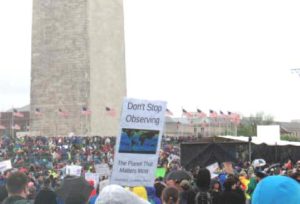 Volume 389, Number 10080
Volume 389, Number 10080
29 April 2017
WORLD REPORT Americans push back against President Trump’s proposed budget cuts… Susan Jaffe, The Lancet’s Washington correspondent, reports.
President Donald Trump is famous for his early morning Tweets and off-the-cuff remarks that can sometimes be puzzling. But what he thinks about biomedical research and basic science is quite clear in his first proposed budget for running the federal government.

March for Science, Washington, D.C. / Susan Jaffe
Trump’s America First: A Budget Blueprint to Make America Great Again outlines a $1·1 trillion spending plan that would take effect when the new fiscal year begins in October. The president wants to move $54 billion from domestic agencies to fortify the US military. To help pay for the transfer, he is proposing funding cuts for the US Environmental Protection Agency (EPA; 31%) and the National Institutes of Health (NIH; 18%) [and other domestic agencies]….
To squeeze $5·8 billion out of the agency’s $30·3 billion budget, the Trump administration would reorganise NIH’s 27 institutes and centres and “rebalance federal contributions to research funding” according to the budget blueprint. …Health and Human Services Secretary Tom Price told a congressional committee last month that the NIH could operate on a tighter budget by cutting the roughly 30% of grant money that pays for indirect research costs. These expenses can include rent, utilities, administrative staff, and equipment. “That money goes for something other than the research that’s being done”, Price said.
Price’s suggestion was especially disturbing coming from the person who is responsible for overseeing the NIH, said Harold Varmus, who directed the NIH in the 1990s and headed the National Cancer Institute at NIH for 5 years until 2015. “You can’t do research in the dark”, he said. “You can’t do research—at least my kind of research—without a building and without electricity and water and administrative expenses”. [Continued here]
…

